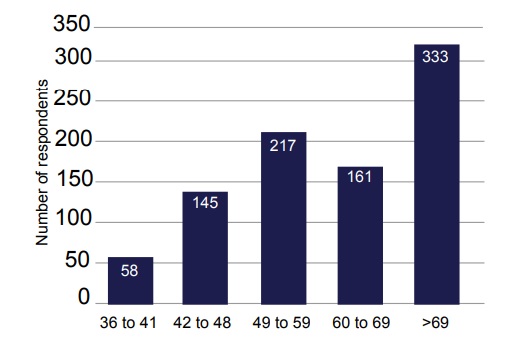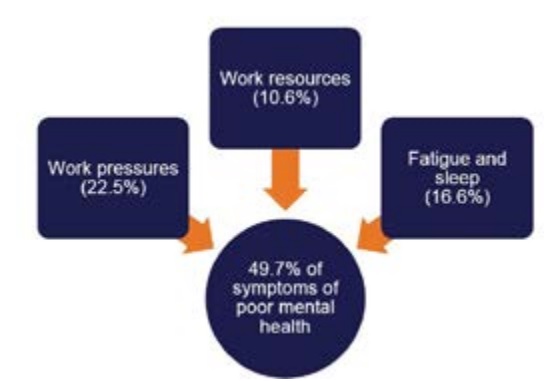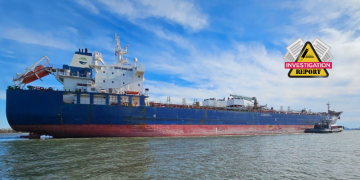AMSA issued a safety awareness bulletin discussing possible risk factors and findings from some of the most current studies on seafarers’ mental health and providing suggestions on how to enhance good mental health at sea. Social isolation, long working hours, commercial and regulatory pressures are some factors that may contribute to seafarers’ poor mental health.
A recent study by Sailors’ Society and Yale University showed 26% of seafarers show signs of depression and nearly half of them won’t ask for help.
Mental health of seafarers visiting Australian ports
[smlsubform prepend=”GET THE SAFETY4SEA IN YOUR INBOX!” showname=false emailtxt=”” emailholder=”Enter your email address” showsubmit=true submittxt=”Submit” jsthanks=false thankyou=”Thank you for subscribing to our mailing list”]
Together with two leading universities, AMSA recently surveyed 1026 seafarers visiting Australian ports. More than 20% reported that they felt strain due to being away from their family, and a considerable number of respondents reported that they work more than 69 hours per week.

The reported hours of work per week is alarming given results indicate that seafarers who experience high work pressures or suffer from fatigue and sleep problems are more likely to experience symptoms of poor mental health, such as depression and anxiety.

Causes of poor mental health at sea
ISWAN has earlier identified some risk factors that may contribute to poor mental health:
- high work pressures on board
- increasingly repetitive and boring tasks
- difficulty in getting sufficient high quality sleep and rest
- worry about the consequences of making a mistake
- being away from home for long periods of time
- pressure from more frequent inspections and administrative tasks
- greater commercial pressure from ashore.
How to support good mental health at sea
1. Individually:
- eat healthy
- engage in physical activity
- get enough sleep
- connect with family, friends, and colleagues
- use online resources, such as self-assessment tools and health and wellbeing trackers -sometimes these are available as free smartphone applications.
Where serious mental health concerns exist, online resources should be used as a complementary tool only. They are not a substitute for meeting with a health professional. If you feel affected by poor mental health, seek professional support as soon as possible.
2. Interpersonally
Spending a lot of time with colleagues can put us in a good position to observe whether a work mate is well or unwell. Reaching out and making colleagues feel valued and accepted can help create a more supportive environment. Gathering relevant information and resources, or assisting in making an appointment with a health professional, are useful ways in which colleagues can provide support.
3. Operators
The Seafarers International Research Centre recommends that vessel operators take steps to reduce fatigue by ensuring appropriate sleeping arrangements on board. This can be done by:
- screening out daylight,
- minimising disturbances
- placing a sufficient number of crew on board.
- providing healthy meal options and access to amenities such as communal areas, internet, and shore leave.
4. Community
A family with a seafaring member can also suffer. By supporting each other, seafarers, their families, and communities are best placed to improve their wellbeing. Research has also shown how social media provides an important platform, not only for seafarers to connect with their partners ashore, but for family members of different seafarers to connect and support each other.
5. Policy
Regulatory frameworks such as MLC Convention support the rights of seafarers to health protection, medical care, welfare measures, and other forms of social protection.
As part of its Good Mental Health Guides series in cooperation with ISWAN, the Shipowners Club has issued, earlier in 2018, two infographics focusing on mindfulness and mental health to enhance wellbeing onboard.
AMSA provided a takeaway message:
Good mental health is important for both personal wellbeing and work performance. In contrast, poor mental health can lead to illness and reduced productivity. It is therefore essential to support good mental health among seafarers. In doing so, it should be recognised that individuals, families, communities, employers, work mates, and regulators can all make a difference.
Useful resources
- The International Seafarers’ Welfare and Assistance Network is a charity dedicated to the relief of need, hardship or distress amongst seafarers of all nationalities.
- SANE Australia is a charity working to support Australians affected by complex mental illness. SANE’s work includes mental health awareness, online peer support and information, stigma reduction, specialist helpline support, research and advocacy.
- Hunterlink is an employee assistance provider in Australia that specialises in early intervention programs, psychological and behavioural counselling with individual and organisational coaching.
- The Black Dog Institute is a research institute that aims to reduce the incidence of mental illness and the stigma around it — to actively reduce suicide rates and empower everyone to live the most mentally healthy lives possible.
- Beyondblue provides information and support to help everyone in Australia achieve their best possible mental health, whatever their age and wherever they live.
- Lifeline is a charity providing all Australians experiencing a personal crisis with access to 24 hour crisis support and suicide prevention services.
Further details may be found by reading the official document by AMSA:






























































